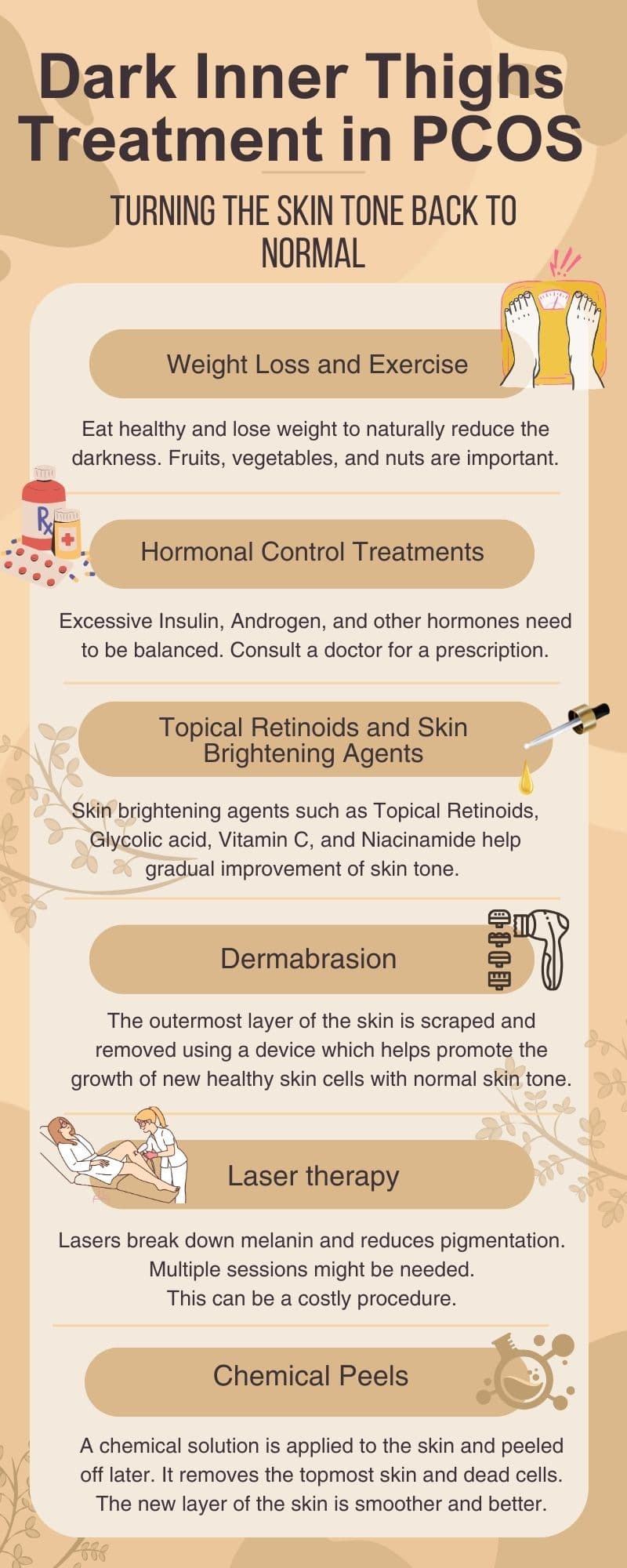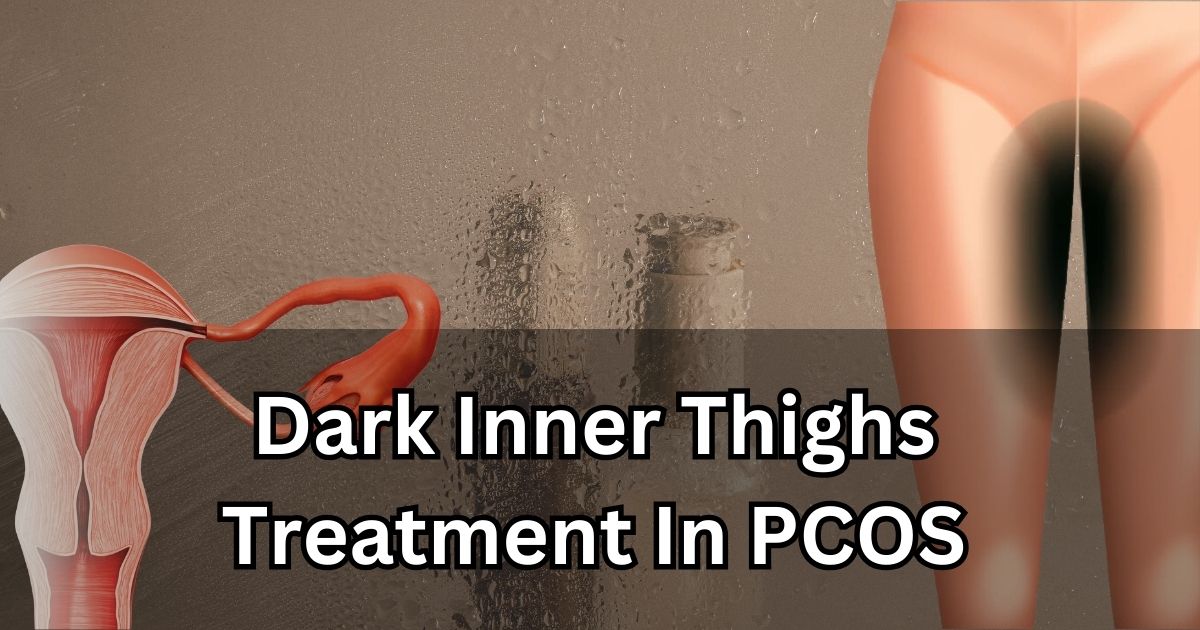Dark inner thighs in PCOS are caused by high insulin (hyperinsulinemia) and Androgen (male hormone) levels in the body. These dark patches make inner thighs thick, velvety, and leather-like.
This condition is also known as acanthosis nigricans.
PCOS can also manifest as acne, hair loss, oily skin, male pattern hair growth, and dark, rough skin patches on places other than the thighs.
The best solution for PCOS-affected dark inner thighs is to treat the cause:
- Reduce insulin levels
- Correct hormonal imbalance
- Metformin
- Exercise
- Lose weight if obese
- Eat healthy
Other treatment options include:
- Chemical Peels
- Topical retinoids
- Dermabrasion
- Laser therapy
- Dietary supplements
- Microneedling
These practices make the skin better with time.
Table of Contents
The Best Treatment: Treat The Cause
Skin darkening is a benign and harmless symptom of polycystic ovary syndrome (PCOS). It can be reversed by dietary and lifestyle improvement and treating the cause of PCOS.
Skin appearance can be improved by various cosmetic products and procedures.

Eat a Healthy Diet and Exercise:
Most people skip this part of treatment because they think it is ineffective or not good enough.
But remember that medical research and dermatologists have declared a healthy diet, exercise, and weight loss the best treatment options for PCOS-induced skin darkening.
Cosmetic procedures and other medicines can also be used to improve skin appearance, but they come with their side effects.
Since darkening of the thighs is caused by insulin insensitivity and raised Androgen levels, our goal should be to improve insulin sensitivity. This can be achieved by following.
Weight Loss
Follow an exercise routine with cardio. Weight loss reduces high insulin levels, hence reducing darkness on the skin.
High-Fiber Foods
Avoid foods that contain high sugar levels. Take more fruits, vegetables, and healthy fats in your diet. They maintain excellent glycemic control and are effective.
Natural Fatty Acids
Include seeds, nuts like almonds and walnuts, avocados, and fish in your diet.
A study found that fish oil containing omega-3 fatty acids cured skin darkening in women with PCOS.
After careful consideration, We found Nature Made Fish oil an ideal choice for individuals with PCOS.
Keep skin hydrated
Thick, harsh, and leathery skin can be softened with proper care and hydration. Hydration and water intake keep skin smooth and glowy.
Metformin
It is an anti-diabetic drug that improves the body’s insulin sensitivity, gradually reducing skin darkening. It should only be used when recommended by a doctor.
Hormonal Control Treatments
Oral Contraceptives help reduce Androgen levels that gradually reduce skin darkness, acne, and Hirsutism. They also help improve the menstrual cycle.
A doctor may also advise anti-androgen drugs that are important to weed out the root cause of hormonal imbalance.
Never use hormonal treatment without consultation with a doctor.
Cosmetic Treatments
Moisturizer
A moisturizer keeps skin soft, smooth, and hydrated. It can improve the leathery texture of the skin. It is one of the most essential products to use for the skin in PCOS.
We found that CeraVe SA Cream is the top choice for PCOS-affected rough and dark skin. It contains a powerful combination of salicylic acid, lactic acid, and ceramides, all working together to enhance the brightness and smoothness of the skin.
Topical Retinoids
Retinoids are forms of Vitamin A.
They include Adapalene, Acnatac, Aklief, Tazoretene, Tretinoin and more.
They Prevent the skin from being oily and thick. They increase the normal shedding of the skin cells, improving cell turnover. This evens out skin tone and reduces darkening.
Medical research has validated the beneficial impacts of retinoids in the resolution of skin darkening associated with PCOS in a diverse group of patients.
They can make skin sensitive and may have some side effects; hence, they should be used after careful consideration and consultation with a dermatologist.
- Apply at night
- Use a moisturizer after application of retinoids.
- Avoid if pregnant
- Watch out for allergic reactions and side effects
La Roche-Posay Effaclar Adapalene stands out as the highest-quality retinoid we’ve come across.
Differin Adapalene offers a cost-effective solution without compromising on quality.
Hydroquinone
It can be used at night for skin lightening. It reduces pigmentation.
It is not recommended to be used for prolonged periods. Avoid using more than 3-4 consecutive months.
Only use after careful consultation with a doctor.
Dermabrasion
This is a procedure performed by a dermatologist. The outermost layer of the skin is removed using a device.
The scraping of the outer skin promotes the growth of new healthy skin cells with normal skin tone.
Laser Therapy
IPL and certain other lasers break down melanin and help reduce pigmentation. This therapy is performed in specialized dermatology setups.
Multiple sessions might be needed depending on the type of laser used for optimal results.
This can be a costly procedure.
Chemical Peels
A chemical solution is applied to the skin and peeled off later. It removes the topmost skin and dead cells.
The new layer of the skin is smoother and better.
Different types of peels can be used depending on the skin situation. Consult with a dermatologist before using it.
Glycolic Acid
Glycolic acid removes dead skin cells from the topmost layer of the skin. It promotes the growth of new and normal skin cells. It improves the tone and texture of the skin.
Use a low percentage glycolic acid cream twice a week.
CeraVe’s Skin Renewing Nightly cream has a combination of glycolic and lactic acids combined with ceramides. It is an ideal choice for PCOS skin as these ingredients provide tremendous benefits.
Other Skin Lightening Options
These products can reduce the pigmentation of the thighs
- Vitamin C
- Azelaic acid
- Kojic acid
- Niacinamide

Things to Keep in Mind
Dark inner thighs in PCOS are a common thing from which many women suffer.
With proper management, this condition can be cured naturally.
Although PCOS is the abnormality of the ovaries, the symptoms also appear on the skin.
Treat Other PCOS symptoms
Don’t just treat dark thighs; you need to treat other symptoms of PCOS as well, like infertility, hair fall, acne, etc.
The complete resolution of PCOS-induced dark inner thighs depends upon the resolution of PCOS itself and not just the superficial skin treatments.
Avoid Aggressive Scrubbing
Aggressive scrubbing should be avoided as it may lead to flakiness and dryness of the skin. In some cases, it can worsen the situation.
Avoid Bleaching if Sensitive Skin
If you have sensitive skin, then avoid bleaching. It can irritate the skin, which may lead to swelling.
Monitor Blood Sugar Levels
To monitor your insulin sensitivity and diabetic control, you should keep checking your blood sugar levels and keep them within normal limits.
Avoid Tight Clothing and Undergarments
You should avoid chafing (rubbing of skin). Wear loose clothing and give your skin room to breathe. Tight clothing can cause dryness, skin rashes, and irritation.
It can also lead to the formation of skin tags and unwanted skin folds and creases.
What Causes Dark Inner Thighs in PCOS
PCOS can change normal hormone levels in many ways. Insulin and male hormone androgen are increased in PCOS.
High insulin levels in the skin cause dark inner thighs. This insulin promotes the growth of additional skin-darkening cells (melanocytes).
The body does not properly utilize insulin; hence, its unused abundance wreaks havoc on the skin and body.
Insulin causes skin cells and pigment cells to rapidly increase in numbers, especially at places like inner thighs, armpits, back of the neck, and other areas with skin creases or folds.
Research says obesity (increased weight) and high androgen are also associated with skin darkening in PCOS.
Sometimes, skin tags are caused, and they need a visit to a doctor who may treat skin tags with cryotherapy or other modalities.
Takeaway
PCOS-induced dark inner thighs fade with time if the root cause (Hormonal imbalance) is appropriately managed.
Weight control, exercise, a healthy diet, and home remedies can naturally reduce skin pigmentation.
There are many cosmetic options as well, like chemical Peels, topical retinoids, dermabrasion, laser therapy, and microneedling.
However, it is always better to start with natural solutions and consult a doctor before undergoing additional treatment.




